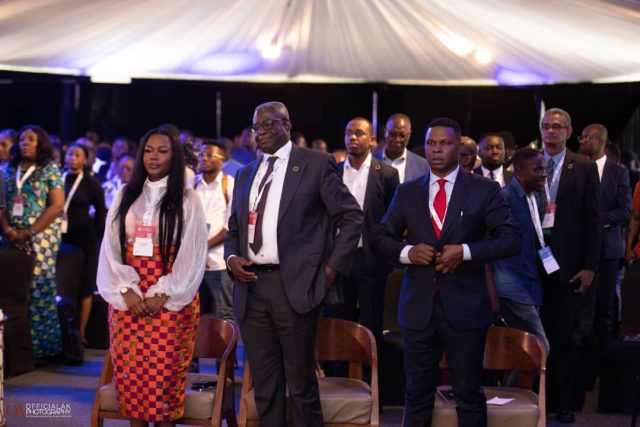The Africa Energy Technology Conference held in Ghana at the Labadi Beach Hotel stands as a testament to the continent’s commitment to shaping a sustainable energy future.
With a focus on technological innovation, policy integration, and collaboration, the conference brought together key stakeholders, industry leaders, and policymakers to chart a course towards a more inclusive and equitable energy ecosystem.
As we reflect on the success of this year’s event, we also look ahead to the future of the Africa Energy Technology Centre (AETC) and the promises it holds for the next Africa Energy Technology Conference in 2025.
The Africa Energy Technology Conference 2024 was a resounding success. Over the course of two days, attendees explored a wide range of topics, from renewable energy and technological advancements to policy frameworks and investment opportunities.
Distinguished speakers, including government officials and industry experts, shared valuable insights and perspectives, driving meaningful discussions, and fostering collaboration.
One of the hallmarks of the AETC 2024 was its diverse array of sessions and panels, each offering unique perspectives and expertise on the most pressing issues facing Africa’s energy sector.
From high-level keynote addresses to interactive discussions, participants had the opportunity to engage with thought leaders, industry experts, and policymakers from across the globe. These exchanges sparked new ideas, challenged existing paradigms, and catalysed action towards a more sustainable energy future.
Also, the AETC 2024 served as a platform for forging partnerships and collaborations that will drive tangible impact in the months and years to come.
Through networking events, business matchmaking sessions, delegates had the chance to explore investment opportunities, showcase their innovations, and form strategic alliances with like-minded organizations.
These connections are poised to accelerate the pace of innovation, unlock new markets, and propel Africa’s energy ecosystem to new heights.
One of the central themes that emerged from the discussions was the importance of technological innovation in driving Africa’s energy transition.
Participants emphasized the need for investment in renewable energy technologies and digital solutions, to enhance energy access, improve efficiency, and reduce environmental impact.
From solar and wind power to hydrogen and nuclear energy, there was a consensus on the importance of diversifying the energy mix and embracing clean, sustainable sources of power.
Another key focus area was the role of policy integration and regulatory frameworks in shaping the energy transition.
Participants highlighted the need for cohesive, forward-thinking policies that prioritize sustainability, inclusivity, and resilience.
From harmonizing market regulations to incentivizing green finance and ESG investments, there was a recognition of the pivotal role that governments, policymakers, and regulatory bodies play in driving systemic change within the energy sector.
Various discussions also centred around the importance of collaboration and partnership in accelerating energy investment and innovation in Africa.
Participants stressed the need for public-private partnerships, cross-sectoral collaborations, and knowledge sharing initiatives to bridge the gap between policy formulation and implementation.
By fostering collaboration among governments, industry players, academia, and civil society, participants expressed optimism about the potential to unlock new opportunities, mitigate risks, and drive sustainable development across the continent.
As we set our sights on the horizon, the Africa Energy Technology Centre envisions an even more impactful and transformative conference in 2025.
Building upon the foundation laid by the AETC 2024, the upcoming conference will delve deeper into critical issues, explore emerging trends, and catalyze action towards a sustainable energy future for Africa.
In preparation for the 2025 conference, the AETC will intensify efforts to engage a broader spectrum of stakeholders, including youth, women, and marginalized communities, ensuring their voices are heard and their perspectives are integrated into the dialogue.
Recognizing the importance of diversity and inclusion, the Centre will work tirelessly to create a platform that reflects the rich tapestry of Africa’s energy ecosystem and fosters collaboration across borders and sectors.
The Africa Energy Technology Centre will also embark on various initiatives and partnerships aimed at addressing key challenges and seizing opportunities within the energy sector.
These may include research and development projects, capacity-building programs, and advocacy efforts to promote policy reform and investment in sustainable energy infrastructure. The AETC will also seek to strengthen partnerships with governments, industry players, and international organizations to drive collective action and impact.
In addition to ongoing efforts, the Africa Energy Technology Centre will embark on comprehensive sensitization programs aimed at raising awareness and driving behavioural change towards sustainable energy practices.
These programs will target various stakeholders, including policymakers, industry leaders, local communities, and the public, with the aim of fostering a deeper understanding of the importance of energy transition and its implications for socio-economic development.
Through targeted workshops, seminars, and outreach activities, the AETC will engage stakeholders at all levels, providing them with the knowledge, tools, and resources needed to embrace renewable energy solutions, energy efficiency measures, and sustainable practices. These sensitization programs will also highlight the social, environmental, and economic benefits of transitioning to clean energy sources, emphasizing the role that each individual and organization can play in driving positive change.
AETC will collaborate with educational institutions, civil society organizations, and grassroots initiatives to integrate energy literacy and sustainability education into curricula and community programs. By empowering future generations with the knowledge and skills to navigate the energy transition, the Centre aims to create a legacy of sustainability and resilience across Africa.
As part of its commitment to inclusivity and equity, the AETC will prioritize partnerships with marginalized communities and underserved populations, ensuring that they have access to information, resources, and opportunities to participate in the energy transition.
By amplifying the voices of those most affected by energy poverty and environmental degradation, the Centre seeks to build a more just and equitable energy future for all.
As we embark on this journey towards the AETC 2025, let us remain steadfast in our commitment to building a brighter, more sustainable future for Africa. Together, we have the power to shape history, transform lives, and leave a legacy of prosperity and progress for generations to come.


















